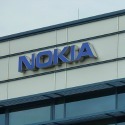
Nokia has been forced to lower its financial guidance and pause dividends after reporting disappointing results for its third quarter amid signs it is struggling in the all-important 5G market against big rivals Ericsson and Huawei.
The Finnish vendor's share price tumbled 23% when markets opened in Helsinki after operating profits at its main networks business fell 28%, to €128 million ($142.6 million), compared with the year-earlier quarter, with total sales edging up just 1% in constant currency terms.
The gloomy update means Nokia no longer expects to outperform its main addressable market this year and next but instead to grow in line with it. Trading at €3.63 ($4.04) this morning, Nokia's share price was at its lowest point in five years.
CEO Rajeev Suri said he was "not satisfied with the current performance" on a call with reporters earlier today, blaming 5G product costs and pricing pressure for the worse-than-expected results.
Overall sales rose 4% on a reported basis, to €5.69 billion ($6.34), while net profit slid 14%, to €267 million ($297 million), on Nokia's non-IFRS (International Financial Reporting Standards) basis.
Nokia continues to insist the fourth quarter will be "strong" and is still aiming for a long-term operating margin of between 12% and 14% -- the same range that Ericsson is targeting.
But the performance raises questions about the company's ability to compete in 5G against mobile infrastructure market leader Huawei and a resurgent Ericsson, which has been offering generous terms to service providers on a mission to grow its share of business.
In late 2017, Ericsson replaced Nokia as one of Deutsche Telekom's main radio access network vendors in Germany and it is also phasing Nokia out of Vodafone's UK network as the operator starts to deploy 5G technology.
Nokia's mobile access business generated €2.86 billion ($3.19 billion) in third-quarter revenues, up 4% year-on-year but just 1% in constant currency terms, while the gross margin for networks fell 5 percentage points, to 29.1%, compared with the year-earlier quarter.
The figures are in stark contrast to those published last week by Ericsson, whose networks business reported 4% organic growth in sales and managed a gross margin of 41.6%, up from 41.3% a year earlier, despite its willingness to accept less profitable 5G deals.
Among various issues Suri flagged were "profitability challenges" in China, where sales dropped more than a fifth, to €425 million ($473.5 million), compared with the year-earlier quarter.
The slump comes ahead of commercial tenders for 5G and follows a warning by Nokia that support for local vendors is growing in the Chinese market.
With network research-and-development expenses down 7% year-on-year, to €703 million ($783 million), Nokia said it would respond to the latest setbacks by increasing its investments in 5G technology.
Investors, however, may have been alarmed by his guidance on the timing of a recovery. "We have challenges in the early stages of 5G but we expect progressive improvements and to be in a much stronger position in 2021," Suri told reporters.
Want to know more about 5G? Check out our dedicated 5G content channel here on
Light Reading.
Despite the headwinds, Suri said he was "confident" Nokia had the right strategy and that its ability to provide the full gamut of core, fixed and mobile products to service providers -- something Ericsson cannot offer without partnerships -- would ultimately pay off.
He also drew attention to a much better performance at the fledgling Enterprise business, which sells network products and services to customers in a range of industries. Sales at that were up 30% year-on-year, to €333 million ($371 million).
Nokia's software business, which develops 5G core network products along with business and operational support systems, was another bright spot. Revenues at that unit rose 9%, to €677 million ($754 million), while operating profits more than doubled, to €156 million ($174 million).
For all the focus on 5G, mobile access was not the worst-performing part of networks, with sales of fixed access products down 7% year-on-year, to €466 million ($519 million), and revenues generated by optical equipment falling 5%, to €390 million ($435 million).
IP routing remained strong, reporting 17% growth in third-quarter sales, to €716 million ($798 million), compared with the year-earlier period.
The small but highly profitable technology division -- which licenses Nokia's brand and intellectual property to phone makers -- also turned in a healthy performance. Sales were up 2% year-on-year, to €358 million ($399 million), and operating profits rose 1%, to €294 million ($328 million).
Related posts:
— Iain Morris, International Editor, Light Reading
About the Author(s)
You May Also Like



.jpg?width=300&auto=webp&quality=80&disable=upscale)








